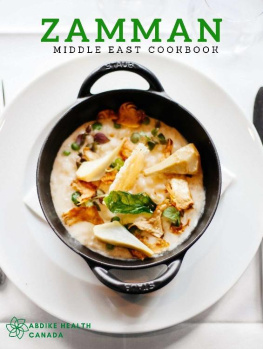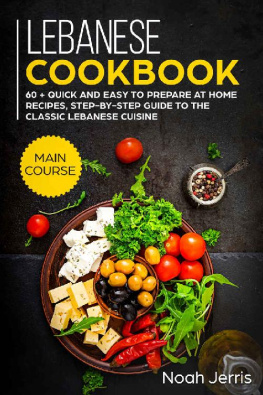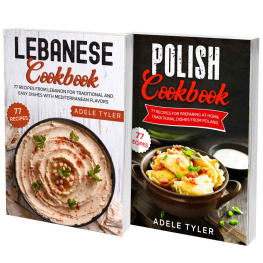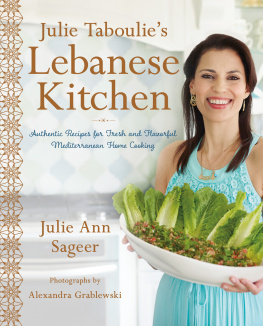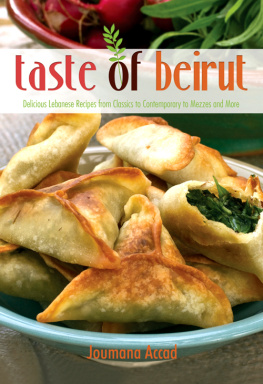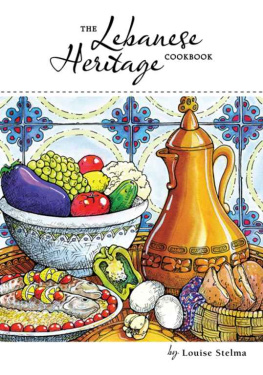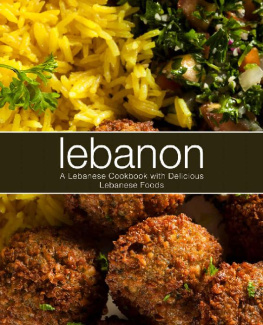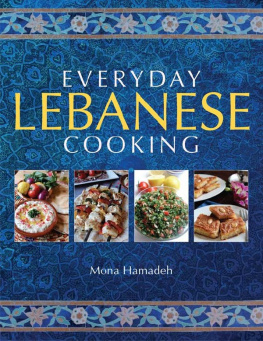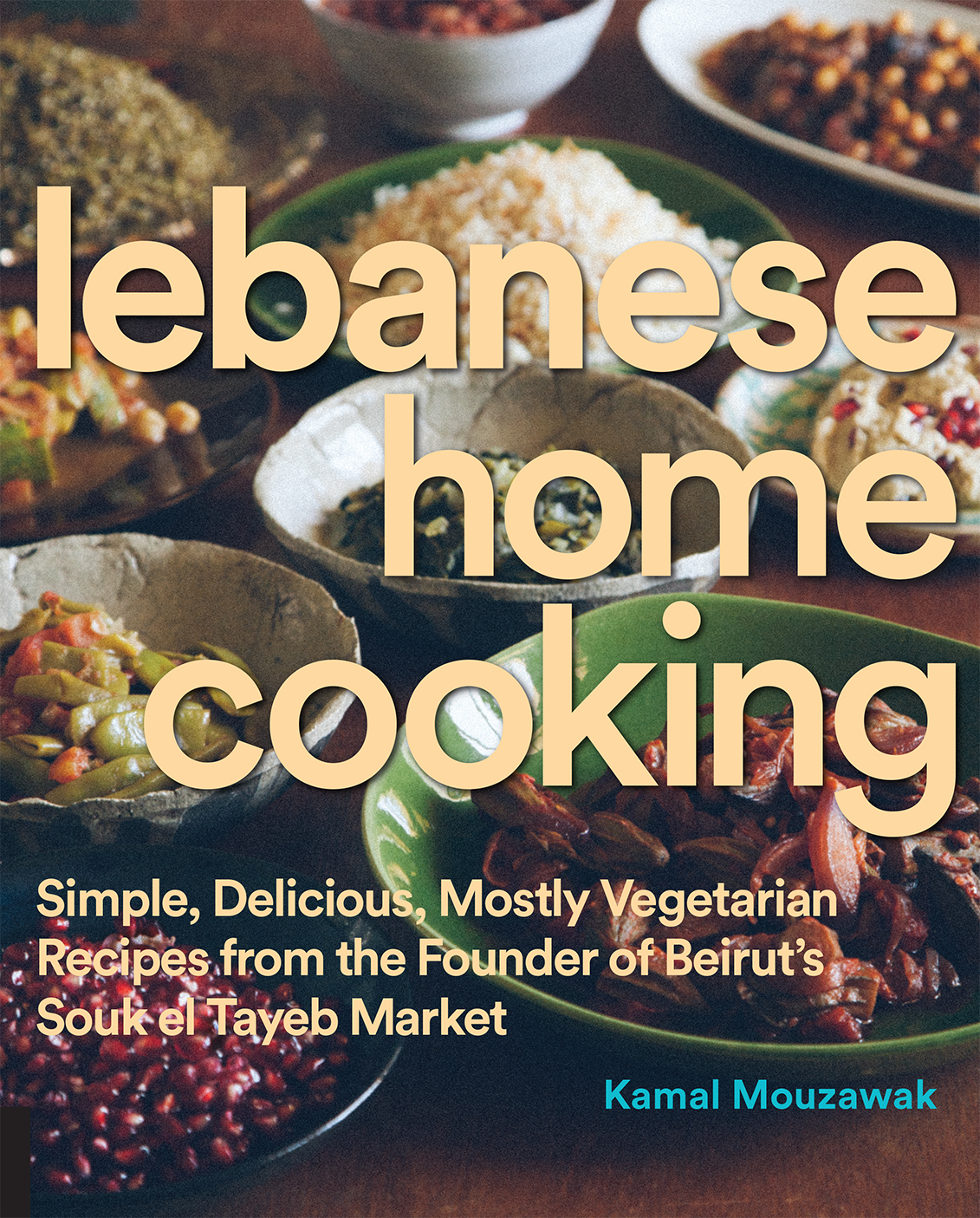lebanese home cooking
Simple, Delicious, Mostly Vegetarian Recipes from the Founder of Beiruts Souk el Tayeb Market
Kamal Mouzawak

2015 by Quarry Books
Text and Photography 2015 Quarry Books
First published in the United States of America in 2015 by
Quarry Books, a member of Quarto Publishing Group USA Inc.
100 Cummings Center
Suite 406-L
Beverly, Massachusetts 01915-6101
Telephone: (978) 282-9590
Fax: (978) 283-2742
www.quarrybooks.com
Visit www.QuarrySPOON.com and help us celebrate food and culture one spoonful at a time!
All rights reserved. No part of this book may be reproduced in any form without written permission of the copyright owners. All images in this book have been reproduced with the knowledge and prior consent of the artists concerned, and no responsibility is accepted by the producer, publisher, or printer for any infringement of copyright or otherwise, arising from the contents of this publication. Every effort has been made to ensure that credits accurately comply with information supplied. We apologize for any inaccuracies that may have occurred and will resolve inaccurate or missing information in a subsequent reprinting of the book.
Digital edition: 978-1-62788-334-4
Softcover edition: 978-1-63159-037-5
Digital edition published in 2015
Library of Congress Cataloging-in-Publication Data is available
Design: Jonathan Hanahan & Dani LaFountaine, Milieu
Photography: Ayla Hibri
CONTENTS
Guide
INTRODUCTION
Do you really need another cookbook? How many do you already own? What would you use it for? Do you ever open a cookbook to cook? Or it is more like a perfect object to look at? Do I sound like your mom? If so, Id rather evoke her, not by reprimanding you, but by cooking with you!
Why? Because no one can teach cooking. And no one can be taught to cook. You just cook! Like you breathe, you live, you make love, you walk no one taught you how to walk. Can you imagine? Put your right foot in front, lean on it, then move the left farther ahead ! You have never said this or heard this being told to a one-year-old toddler. That child just tried to walk, and you just stood by, watching and encouraging, until he or she walked alone!
So, you just cook! And you cook for so many reasons: because you need to feed yourself; because you need to feed your family; because you need to gather around what can be shared by a group, a tribe of family, or friends; because you want to treat yourself and others; because you can communicate love and caring through a bite; because this is how you live; or because this is how you can perpetuate what you lived.
Sales of books in most literary genres are downexcept for food and drink, and religion! Is food the new religion? Do foodies find in food and cooking the life they dream about and aspire to? There are many chefs, cooks, and lifestylers who will tell you, and issue edicts, on what must be done, eaten, and bought for a better life!
As British journalist Steven Poole, author of You Arent What You Eat, says, We no longer trust politicians or the clergy; but we are hungry for cooks to tell us not just how to eat but how to live, the moralistic synecdoche easily accomplished since we now happily accept that one lives through eating.
The Orchards of Jeita
In Lebanon, I grew up around orchards in Jeita, a small village close to Beirut that is known for its wonderful caves. Men were busy in the gardens, planting herbs and salad greens and harvesting citrus fruits and almonds. And women were busy in the kitchens, transforming the gardens bounties into what we ate for breakfast, lunch, and dinnerand competing over who could do what best. Obviously, each one thought all that she did was the best and looked with pity on the lesser good the others did!
My mother had her cahier de recettes, a notebook of handwritten recipes of dishes or cakes she had tasted, and so recorded recipes like kke tante Eugnie (a cake, in her own way of writing Englishwhen she knew French but not English!) and osmalyieh de Thrse (a pastry), but never a main dish. And she had an old French dessert cookbook, inherited from a nun in the nearby convent, written by Henri-Paul Pellaprat, who wrote the cooking bible of every French household in the old days. Main dishes were never in the cahier de recettes. How could they be? Baking was one thing, but cooking was just understood. It was never written, never taught. You just cook!
You just join a cook in the kitchen, help and watch, and you will learnnot the recipe, but the way. And then you will make it your own way. We all learn the same alphabet, but no two people ever write the same way.
In school, I studied graphic design. But I never worked in it. I worked at Art et Culture, the first cultural center that sprouted after the civil war in Lebanon ended (1991), and that was a great teaching time in my life. I saw people from all regions, the different religions and politics of Lebanon, those who were fighting yesterday but were coming together then around art and culture. It was a common ground that could bring them all together, looking for similarities beyond their differences.
And so I started touring a country I had lived in but had never known (Lebanon during the war was divided into many unreachable parts) and started discovering wonderful people, the same everywhere, who had in common a land, an agriculture, and a cuisine.
I started writing about travel and food, about places, traditions, the hows and whys, trying to understand a bit better this patchwork that was Lebanon. Its a place like nowhere else in the world, where everyone is the one and the other at the same time, and where everybody is part of a bigger mosaic that tries to stick together as much as possible: Christians and Muslims, sea people and mountain people, those looking to the East and those looking to the West all trying to make one together!
Then I developed an interest in macrobiotics and in the Slow Food movement. In the spring of 2004, the first Garden Show took place in Beiruts pine forest, and I was in charge of the food section. I gathered ten of the producers and farmers I knew for a five-day event. It was very successful, and so the decision was made to go on with a weekly farmers market, every Saturday morning in downtown Beirut. It is a producers-only market, gathering the best of our land, fields, and kitchens and the best of our farmers, producers, and cooks. Souk el Tayeb was born, and it later developed into an organization with many different activities promoting sustainable agriculture, including the farmers market, the regional food festivals, the food training programs, and Tawlet, the farmers kitchen. Tawlet is a social business, where profit is generated to support farmers, cooks, and food producers.


